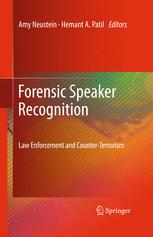

Most ebook files are in PDF format, so you can easily read them using various software such as Foxit Reader or directly on the Google Chrome browser.
Some ebook files are released by publishers in other formats such as .awz, .mobi, .epub, .fb2, etc. You may need to install specific software to read these formats on mobile/PC, such as Calibre.
Please read the tutorial at this link: https://ebookbell.com/faq
We offer FREE conversion to the popular formats you request; however, this may take some time. Therefore, right after payment, please email us, and we will try to provide the service as quickly as possible.
For some exceptional file formats or broken links (if any), please refrain from opening any disputes. Instead, email us first, and we will try to assist within a maximum of 6 hours.
EbookBell Team

4.8
54 reviewsForensic Speaker Recognition: Law Enforcement and Counter-Terrorism is an anthology of the research findings of 35 speaker recognition experts from around the world. The volume provides a multidimensional view of the complex science involved in determining whether a suspect’s voice truly matches forensic speech samples, collected by law enforcement and counter-terrorism agencies, that are associated with the commission of a terrorist act or other crimes. While addressing such topics as the challenges of forensic case work, handling speech signal degradation, analyzing features of speaker recognition to optimize voice verification system performance, and designing voice applications that meet the practical needs of law enforcement and counter-terrorism agencies, this material all sounds a common theme: how the rigors of forensic utility are demanding new levels of excellence in all aspects of speaker recognition. The contributors are among the most eminent scientists in speech engineering and signal processing; and their work represents such diverse countries as Switzerland, Sweden, Italy, France, Japan, India and the United States.
Forensic Speaker Recognition is a useful book for forensic speech scientists, speech signal processing experts, speech system developers, criminal prosecutors and counter-terrorism intelligence officers and agents.